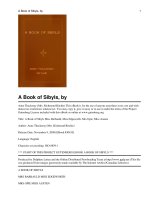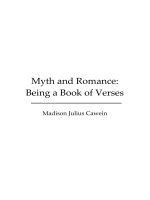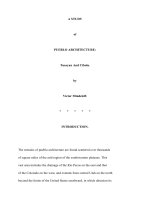- Trang chủ >>
- Khoa Học Tự Nhiên >>
- Vật lý
they never said it a book of fake quotes misquotes and misleading attributions jun 1990
Bạn đang xem bản rút gọn của tài liệu. Xem và tải ngay bản đầy đủ của tài liệu tại đây (7.97 MB, 186 trang )
THEY NEVER SAID
IT
This page intentionally left blank
THEY NEVER SAID
IT
A
Book
of
Fake Quotes, Misquotes,
and
Misleading
Attributions
Paul
F.
Boller,
Jr.
John
George
New
York Oxford
OXFORD UNIVERSITY PRESS
1989
Oxford University Press
Oxford
New
York
Toronto
Delhi
Bombay Calcutta Madras Karachi
Petalingjaya
Singapore
Hong
Kong
Tokyo
Nairobi
Dar es
Salaam
Cape
Town
Melbourne Auckland
and
associated companies
in
Berlin
Ibadan
Copyright
©
1989
by
Paul
F.
Boiler,
Jr.,
and
John
George
First
published
in
1989
by
Oxford University Press, Inc.,
198
Madison Avenue,
New
York,
New
York
10016-4314
First issued
as an
Oxford University Press paperback,
1990
Oxford
is a
registered trademark
of
Oxford University Press
All
rights reserved.
No
part
of
this publication
may be
reproduced,
stored
in a
retrieval system,
or
transmitted,
in any
form
or by any
means,
electronic,
mechanical, photocopying, recording,
or
otherwise,
without
the
prior permission
of
Oxford University Press,
Inc.
Library
of
Congress
Cataloging-in-Publication Data
Boller, Paul
F.
They
never said
it : a
book
of
fake
quotes, misquotes,
and
misleading
attributions
/
Paul
F.
Boiler,
Jr.,
and
John
George.
p. cm.
Includes index.
1.
Quotations.
2.
Errors
and
blunders, Literary.
3.
Literary
curiosa.
4.
Literary forgeries
and
mystifications.
5.
Quotation.
I.
George,
John
H. II.
Title.
PN6081.B635
1989
082—dc
19
88-22115
CIP
ISBN
0-19-506469-0
(Pbk)
681097
Printed
in the
United States
of
America
For
Treva
JOHN
For Don
Worcester
PAUL
This page intentionally left blank
Preface
Using
quotations
is a
time-honored practice.
There
have
al-
ways
been people
who
liked
to
liven
up
what they were say-
ing
with appropriate statements
from
the
writings
of
others.
This
was
true even
in
ancient times; Plato used quotations
freely,
and
Cicero's letters
are
full
of
quotations. Today, how-
ever,
quotations tend
to be
polemical rather than decorative.
People
use
them
to
prove points rather than
to
provide plea-
sure.
As a
forensic device, quote-using
has
become practically
indispensable
to
teachers, preachers, politicians, educators,
columnists,
editorial writers, commentators,
and
panelists
who
are
called
upon—or
who go out of
their
way—to
discuss
po-
litical
and
social issues
in
public. What
has
been called
"quotemanship"
(or
"quotesmanship")—the
use and
abuse
of
quotations
for
partisan
purposes—has
during
the
past
few
decades
become
a
highly
refined
art in
this country.
Quotemanship, like Stephen Potter's one-upmanship,
in-
volves
gambits
and
ploys
and
countergambits
and
tricks
and
traps
and
ruses
and
ambuscades. Quotemen (and quote-
women)
do not
simply quote; they quote
in
order
to
score
points, usually
of a
political nature,
and
thereby throw their
opponents
off
balance. Sometimes they merely quote
a
highly
esteemed
authority—Jefferson,
Lincoln,
Emerson—in
order
to
bolster their
own
position.
Other
times they
do
much
better than this: they
dig up a
statement which their oppo-
nent once made that clearly supports their
own
particular
position.
And if
they
are
really lucky, they
may be
able
to
come
up
with some kind
of
gaffe—a
fatuous
remark
or
state-
ment revealing ignorance
or
prejudice—that
casts doubt
on
viii
Preface
their opponent's honesty, integrity,
and
good judgment.
Looking
for
gaffes
has
become
a
major
feature
of
recent
American presidential campaigns.
But
some quoters
are not
satisfied
with
gaffemanship;
nor
do
they
regard themselves
as
bound
by the
customary rules
of
civilized
discourse. They engage
in
what writer Milton
Mayer
once called "contextomy": cutting
a
statement
out of
context
(e.g.,
John Adams
on
religion)
in
order
to
give
a
completely
misleading impression
of
what some
famous
per-
son
believes.
And
some polemicists
go
even farther than this;
they
deliberately make
up
statements
out of
whole cloth
for
use
in
advancing their
own
position
and
damaging that
of
their opponents.
In the
1950s
Wisconsin Senator Joseph
R.
McCarthy
became
a
master
of the
contrived quotation.
On
March
30,
1950,
he
delivered
a
long attack
in the
Senate
on
the Far
Eastern policies
of the
Roosevelt
and
Truman
admin-
istrations,
during
the
course
of
which
he
tried
to
discredit
Owen
Lattimore (who
had
been director
of
Pacific
Opera-
tions,
Office
of War
Information, during World
War II) by
reading
the
following statement
from
a
letter
he
said Latti-
more
had
written
in
1943:
"Fire
from
the
O.W.I.
any man
who
is
loyal
to
Chiang,
and
hire individuals
who are
loyal
to
the
Communist government."
But
when
his
fellow
Senators
asked
to see the
letter
from
which
he
read
his
quotation,
Mc-
Carthy
said
it was
"secret."
It
turned
out
that
he had
simply
made
up the
quote
on the
spot.
Few
quote-mongers
are as
audacious
as
Senator McCarthy.
Most
of
them invent their quotations
in the
quiet
of
their
offices
or the
shelter
of
their homes rather than
in
public.
But
many
of
them
are
just
as
unscrupulous
as the
Wisconsin
Senator. They
enjoy
putting words into
the
mouths
of fa-
mous
people, particularly
the
long-departed,
and
then citing
these
words with
an air of
authority
in
their earnest
little
books,
pamphlets, newspapers, magazines,
and
leaflets.
Some
of
the
quotes
they
make
up
pass
into general circulation
and
are
accepted
as
authentic
by the
general public.
On
occasion
Preface
ix
even serious scholars
and
conscientious public
officials
are
taken
in by
them.
In
September 1985, President Ronald
Reagan made innocent
use of an
old-time
fake
quote
from
Lenin
in one of his
speeches:
"First,
we
will take eastern
Europe, then
the
masses
of
Asia, then
we
will encircle
the
United States which will
be the
last bastion
of
capitalism.
We
will
not
have
to
attack.
It
will
fall
like
an
overripe
fruit
into
our
hands." Lenin
was a
zealot when
it
came
to
com-
munism,
but he was not
stupid.
And he
simply wasn't given
to
making
fatuous
remarks like
the one
about overripe
fruit.
The
overripe-fruit statement
is
just
one of a
host
of
phony
Lenin quotes that have been making
the
rounds
in
this coun-
try
since
the
Bolshevik Revolution
of
1917.
But
there
are
also
plenty
of
fake
Lincoln quotes
in
circulation.
And
there
are
spurious quotes, too,
from
Franklin, Washington,
and
other
notables that turn
up
periodically
in
books, pamphlets, maga-
zine
articles,
and
public addresses. Some
of
these quotes,
to be
sure, originated
in
misunderstanding
or
carelessness
in re-
porting;
and
some
of
them (like
the
quotes about George
Washington's piety)
in
wishful
thinking rather than
in
malice.
And
there
are
plenty
of
harmless concoctions
(we
have
in-
cluded
a
few) which have been
put
into
the
mouths
of
celeb-
rities, mainly show
people,
by
publicity agents
and
gossip
columnists,
in
order
to
jazz
up
their public images. Harm-
less,
too,
are the
misattributed quotes (like
the one
about
the
weather that Charles Dudley Warner,
not
Mark
Twain,
really
made),
and the
misquotes (like Churchill's
"blood,
sweat,
and
tears"), which
are
sometimes improvements
on the
original.
But a lot of the
phony quotes assembled here were delib-
erately manufactured with malice prepense;
the
quote-maker
simply
wrote
out a
statement
of his
own,
put
quotation marks
around
it, and
attributed
it to
someone else.
And his aim was
to
mislead,
not
amuse.
When
Emperor
Charlemagne
died
in 814 and no
comet
appeared, chroniclers simply invented
one and
inserted
it
into
history,
for
comets
in
those days were closely associated
x
Preface
with
the
deaths
of
great leaders. Twentieth-century quote-
mongers
are
like
the
ninth-century comet-makers; they dream
up
things that never happened
but
which
they
think should
have
and
then insert them into history.
For
some reason,
American reactionaries have gone
in
more
for
quote-making
than American radicals.
This
is
possibly because
the
former
feel
more
of a
need
for
authoritative quotes than
the
latter.
Radicals have plenty
of
quotations
from
Karl Marx, anyway,
and
probably
see no
need
to add to the
Marxist treasure-
house. Extreme rightists
in
America have
a
real problem,
in
any
case; they would like
to
cite
the
Founding Fathers,
but
rarely
find
what
they
want
in
Franklin, Washington,
and
Jefferson.
Hence
the
quote-faking.
In the
present book,
we
have made
a
careful
distinction
between
the
misquotations
and
misattributions (usually
un-
intentional)
and the
deliberate
forgeries.
We
have
also
tried,
where possible,
to
track down
the
origin
of the
spurious
quotes contained
in the
book
and
give evidence
for
their
in-
authenticity.
It is
difficult,
of
course,
to
prove negatives;
but
some
of the
statements attributed
to,
say, Washington
and
Franklin,
are so
preposterous that they
are
self-evidently
apocryphal.
But
sometimes
it
takes hours
of
research
in the
collected works
of
noted writers
to
demonstrate that certain
quotations have been concocted
out of
thin air.
It is
amus-
ing,
in a
way,
to find the
sources becoming vaguer
and
vaguer
as
one
follows
the
trail
of a
quotation that
was
improbable
at the
outset. Quote-makers haven't made
it
easy
for the
con-
scientious.
It is
doubtless
too
much
to
expect that
a
book like They
Never
Said
It
will succeed
in
putting
an end to the
concoct-
ing of
phony statements
for
polemical purposes.
It
may,
though,
be of
real value
to
people
who
resent being taken
in by the
quote-fakers
in our
midst.
John
Ruskin once
la-
mented
the
"splendid mendacity
of
mankind." When
it
comes
to
quotations,
the
mendacity
has
tended
to be
sleazy
rather
than
splendid. It's amusing when fundamentalists
put a re-
Preface
xi
pudiation
of
evolution
in the
mouth
of
Charles Darwin
as he
lay
dying.
But
there
is
nothing
funny
about
the
anti-Catholic
and
anti-Semitic sentiments which hate-mongers have
in-
vented
and put in the
mouth
of the
prejudice-free Benjamin
Franklin.
Texas Christian University Paul
F.
Boiler,
Jr.
Fort
Worth,
Texas
Central
State University John
H.
George
Edmond, Oklahoma
This page intentionally left blank
A
Note
to Our
Readers
We
would appreciate knowing about
any
quotational curiosi-
ties
and
spuriosities which
we
have missed. Please send
ma-
terial
to
either Paul
F.
Boiler, Jr., History Department,
Texas
Christian University, Fort Worth,
Texas
76129,
or to
John
George, Department
of
Political Science, Central State Uni-
versity,
Edmond, Oklahoma 73060.
This page intentionally left blank
Contents
Adams,
John
No
religion
3
Addison,
Joseph
Hesitates-lost
3
Allen,
Ethan
In the
name
of
Jehovah
4
Armstrong, Neil
Small step
4
Beria, Lavrenti
Psychopolitics
5
Teen-agers
6
Bible
Cleanliness
7
Fools rush
in 7
God
helps
7
Pride
8
Safety
in
numbers
8
Spare
the rod 8
The
wind
8
Bogart, Humphrey
Play
it
again
8
Tennis
9
Boyer, Charles
Casbah
9
Brezhnev,
Leonid
Treasure
houses
of
West
9
xvi
Contents
Burke,
Edmund
Indict
a
whole people
10
Triumph
of
evil
10
Butler,
Samuel
Man
convinced against
his
will
11
Cagney, James
Rat 11
Cambronne, Pierre Jacques Etienne
Guard
11
Carlyle,
Thomas
Genius
12
Cervantes,
Miguel
de
Streets
of
by-and-by
12
Churchill, Winston
Blood,
sweat,
and
tears
13
Tax
into prosperity
13
Cicero, Marcus
Tullius
Budget
balancing
14
Cohen, Israel
Racial tension
14
Colson, Charles
Grandmother
16
Communist
Party Directive
Label them
fascists
17
Congreve, William
Music
18
Coolidge, Calvin
Hired
the
money
18
Darwin, Charles
Wish
I
hadn't
19
Devereux, James
P. S.
Send more Japs
20
Contents xvii
Dimitrov,
Georgi
Soviet
power
20
Disraeli, Benjamin
Divide
the
United States
for the
Rothschilds
21
Jews want
to
destroy Christendom
22
Donaldson,
Sam
Hold
on 23
Durocher,
Leo
Nice
guys
23
Edison,
Thomas
Alva
Doctor
of
future
23
Eisenhower, Dwight
D.
Birch Society
24
Emerson, Ralph Waldo
Consistency
25
Mousetrap
25
Fields,
W. C.
Children
and
dogs
25
Philadelphia
26
Francis
I
All is
lost
26
Franklin, Benjamin
Exclude Jews
26
Insidious Catholics
28
Tiger
28
Frietchie,
Barbara
Shoot
if you
must
28
Gaither, Rowan
Overall
aim of
Ford
Foundation
29
Galileo
Does
move
30
Garbo, Greta
Go
home
30
xviii Contents
Garfield,
James
A.
Cheap labor
31
Government
still lives
32
Gaulle, Charles
de
Inevitable communism
33
Joan
of Arc 33
Gibbon,
Edward
Religions
equally true
and
false
34
Gipp,
George
Win one 35
Goering,
Hermann
Reach
for
revolver
36
Goldwater,
Barry
M.
Fraternities
36
Goldwyn,
Sam
Blanket
check
37
Blood
and
thirsty
37
Brink
of
abscess
38
Bull
by
teeth
38
Caustic
38
Comedies
not to be
laughed
at 38
Duck
39
Flashlight
39
Hair
stand
on
edge
of
seat
39
Im-possible
40
Include
me out 40
Indians
40
Make
them Americans
40
Mucus
41
Next
time
I
send
a
fool
41
Read part
of it 42
Psychiatrist
42
S.O.B.
42
Verbal
contract
42
Contents
xix
Gordon,
Sol
Anti-marriage
43
Greeley,
Horace
Go
west
43
Hall,
Gus
Strangled
to
death
44
Hecht,
Ben
Executing Christ
44
Hitler,
Adolf
Law
and
order
45
Holmes,
Oliver
Wendell,
Jr.
Keep
government poor
46
Holmes,
Sherlock
Elementary,
Watson
47
Hoover,
Herbert
Noble experiment
47
Prosperity
around
the
corner
48
Hopkins,
Harry
Damn dumb
48
Tax, spend, elect
49
Howard,
Roy
Too
much
checking
facts
51
Humanist
Manifesto
II
Unbridled sexuality
51
Ickes,
Harold
Modified
communism
52
Ingersoll,
Robert
G.
Humblest
peasant
52
Jackson, Andrew
Let him
enforce
it 53
One man
with courage
53
Victors, spoils
54
xx
Contents
Japanese Government Memo
Competing
for
Japanese investments
55
Jefferson,
Thomas
Best
government
56
Eternal vigilance
56
Jones,
John
Paul
Not yet
begun
to fight 57
Kant,
Immanuel
Copernican revolution
57
Kautsky,
Karl
Socialist
work
58
Khrushchev,
Nikita
Doses
of
socialism
59
Gullible
59
Too
liberal
to fight 60
Treaties
with imperialists
60
Kissinger,
Henry
Day
of
United States past
61
Knights
of
Columbus
Bogus
oath
62
Lawrence,
James
Don't
give
up
ship
63
Lenin, Vladimir Ilyitch
All
slave
63
Best
way to
destroy capitalism
64
Capitalists sell
rope
64
Capitalist
trade
finances
destruction
64
Caress
masses
65
Corrupt young
people
65
Could
not
have come
to
power
66
Fertile
field 66
Firearms registration
66
Five
enemies
67
Freedom
of
speech
67
Give
me a
child
68
Contents
xxi
Immutable
aim 68
Inconceivable
69
Invective,
slander, smear
70
Overripe
fruit
70
Pie
crust
72
Road
to
Paris
72
Socialized
medicine
73
Spend itself
to
destruction
74
Teachers,
professors,
ministers
75
Three-fourths perish
75
Turn
world upside down
76
Useful
idiots
76
Win
Western world
77
Lincoln,
Abraham
All
that loves labor
77
Ancient
sea 78
Anti-Catholic
79
Anti-Prohibition
80
Anti-slavery
81
Baseball
81
Boots
and
Bible
82
Bound
to be
true
82
Cannot
82
Common
people
84
Congenital aversion
84
Corporations
enthroned
85
Danger
from
within
85
Divine
Son of
Mary
86
Equality
of
both races
87
Fool
all of the
people
88
Grandson
89
High
tariff
89
Know
there's
a God 90
Love Jesus
91
Play
a
solo
91
Popular
sovereignty
92
Proud
of
city
92
Teach
economy
92
xxii Contents
Unsoundness
of the
Christian
scheme
93
Warts
93
Wriggle
for
office
94
Long, Huey
Americanism
94
Longworth, Alice Roosevelt
Bridegroom
95
Coolidge
95
Louis
XIV
The
State
is me 95
Maguire,
William
A.
Praise
the
Lord
96
Mankiewicz,
Herman
Grace
of God 96
Manuilsky,
Dimitri
War to the
hilt
97
Marie
Antoinette
Eat
cake
97
Marx,
Groucho
Truman
98
Mather, Cotton
Malignants
called Quakers
98
Napoleon
I
[Napoleon Bonaparte]
Jesus
not a man 99
Shopkeepers
100
Nash,
Ogden
Catsup
bottle
100
Newton,
Sir
Isaac
Shoulders
of
giants
100
Nixon, Richard
M.
Great wall
101
O'Hair,
Madalyn Murray
Stop religious broadcasting
101
Contents xxiii
Otis, James
Taxation
102
Paine,
Thomas
Five Bibles
103
Pepys,
Samuel
Marines
103
Pershing,
John
J.
Lafayette
104
Petain, Marshal Henri Philippe
Shall
not
pass
104
Pinckney, Charles Cotesworth
Anti-Semitic
105
Millions
for
defense
105
Prescott, William
Whites
of
eyes
106
The
Protocols
of the
Learned Elders
of
Zion
Sheep
and
wolves
106
Rabinovich, Rabbi Emanuel
No
more religions
107
Reveal
our
identity
107
Reagan, Ronald
Man-horse
108
Summit
meeting
108
Reed,
John
The
future
works
110
Reuther,
Walter
Soviet America
111
Rogers,
Will
Never
met man 112
Weather
112
Roosevelt, Franklin
D.
Immigrants
113
Nothing wrong with Communism
113
xxiv Contents
Rules
for
Revolution
Rules
for
revolution
114
Scholz,
Jackson
Old
Book
116
Sevigne,
Marquise
de
Hero
to
valet
116
Shaw,
George Bernard
Deaf,
dumb, blind
117
Only interested
in
money
117
Sheridan, Philip
Good
Indian
118
Sherman,
William Tecumseh
Hold
the
fort
118
War is
hell
119
Stalin, Josef
Aid to
backward countries
119
Breaking eggs
120
Ripe
fruit
120
Words
and
actions
120
Sutton, Willie
Rob
banks
121
Taft,
Robert
A.
The
U.N.
121
Talmud
Cheat
a goy 122
Tocqueville,
Alexis
de
Not a
single bureaucrat
122
Twain,
Mark
Lillian Russell
123
Smoking
123
Three
kinds
of
lies
123
Wagner
124
Weather
124









